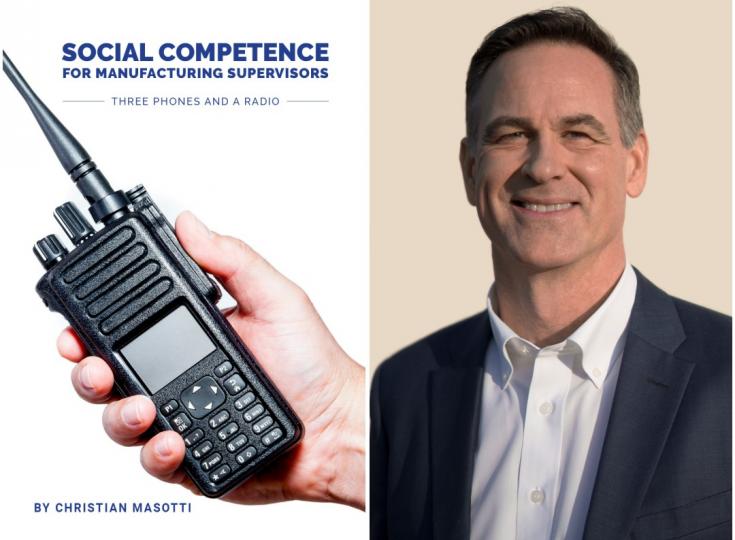Christian Masotti - Social Skills for Supervisors

With 20 years in the workforce, Christian understands that being civil and humane is a critical leadership competency that not only builds trust and credibility, but also impacts bottom-line metrics including safety, quality, delivery, engagement, and efficiency. “Many people perceive having respect, exhibiting kindness, and treating people well, as a sign of weakness – but this, according to Civility Experts Inc. Director of Business Development Christian Masotti, “is a costly mistake.” A graduate of McGill University with years of field experience in OEM manufacturing environments including GM, Ford, and Chrysler, Christian has seen how when leaders have the courage to make decisions, give feedback, and measure success- on quantitative observations, they can create and/or change workplace culture. Christian is a continuous learner who believes that the ability to combine his technical skills including Lean, Six Sigma and Kaizen with social intelligence and cultural competence have been the key to his success. In addition to consulting, keynote presentations, and delivery and design of training with Civility Experts Inc and its 378 affiliates in 43 countries, Christian’s current projects include work with Maple Leaf Sports and Entertainment, Siemens UK, and Bombardier Transportation. As our Author of the Day, he tells us all about his book, Social Competence for Manufacturing Supervisors.
Please give us a short introduction to what Social Competence for Manufacturing Supervisors is about.
The book is about social skills and civil communication for supervisors. Many supervisors don't fully understand how the way you interact and talk to people is critical for building trust, coaching on the job, giving effective feedback, and generally meeting key metrics such as safety and productivity
What inspired you to write this book?
I've been in manufacturing for 20+ years and have had some success. I've noticed that sometimes people with more technical knowledge or on the job experience are struggling to have that same success. I realized that some people just never learned some critical social skills and so thought I'd share what I've learned.
Why is it so important for supervisors to have people skills?
It's the people who produce whatever it is you are manufacturing. The people fix the equipment, the people keep the line going, the people ensure quality is high, the people keep each other safe, etc. The reality is, management often spends a lot of time on policy and procedure - and this is important - but you can't forget about the people. People who are treated well perform better. Sure you can get the job done by managing with fear too, but in the end, there will be a consequence of that. Why not just treat people well from the beginning. You'll get the job done and avoid the negative consequences of incivility at work.
Who would benefit most from this book?
The initial target audience is manufacturing supervisors at any stage of their career, but supervisors in other industries and sectors would benefit as well. Civility in communications is a continuous improvement strategy that works in any environment.
Give us three good-to-know facts about yourself
I graduated from McGill University, I played professional football, and I grew up (and spent most of my working life) in Stoney, Creek Ontario.
You also do team assessments. Please tell us more about this.
The team at Civility Experts Inc. uses a range of assessments including their proprietary Civility Culture Compass® and various individual and targeted assessments. As a Continous Improvement practitioner, I typically spend time assessing workplaces through site visits, spending time on the floor, reviewing workplace documents, interviewing employees at all levels and speaking to the people doing the work.
What is your favorite line in this book?
Be a strong competitor. One critical lesson I learned over the years is that success is hard work. Whether it's professional sports or working the production line, the fact is, success is hard work. You have to be willing to put in the learning and the work. And sometimes things are hard, there are sacrifices and hard choices and sometimes you'll fail. You just keep going.
How can this book benefit more experienced supervisors and managers?
Sometimes we are in a leadership role for a while and we get lazy or fall into ineffective habits. And/or sometimes the environment changes. There is always room for reminders and new learning. Employees' expectations for how they want to be treated and communication best practices change too, so it makes sense for supervisors and managers at any level to be willing to learn something new.
Do you have any interesting writing habits, what is an average writing day like for you?
I can write. But I don't really have time to write and so I was lucky enough to work with the team at Propriety Publishing. We worked out a system where I dictate my ideas and thoughts and their team puts it all together and sends it to me to fill in the blanks, expand ideas, etc. We go back and forth until we have something that reflects my ideas and concepts in a way that will make sense for readers who may not have my experience.
What are you working on right now?
I am just finalizing a second book with a civility expert called Manufacturing Civility. The focus of that book is what I call a 6 Cs Approach to Civil People Treatment. And I have a third book coming out later this year called Lean on Civility. It is a more comprehensive toolkit about how civility is a continuous improvement strategy for manufacturing.
Where can our readers discover more of your work or interact with you?
The Social Competence book is available on Amazon. They can visit my author site at christianmasotti.com or contact my agent at events@civilityexperts who can provide details about keynotes and workshops.





